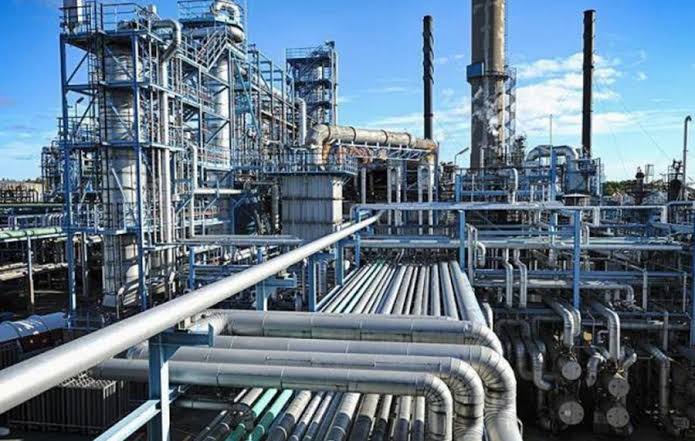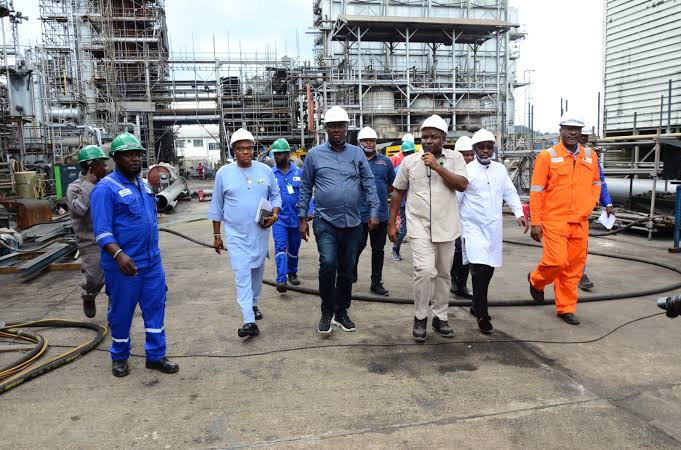Special Features
Prospects: The Long Awaited Resurgence Of Nigeria’s Local Refineries

Nigeria, a country richly blessed with vast crude oil deposits, has continued to grapple with soaring costs of imported refined fuels.
Despite over two decades of promises from successive governments to rejuvenate the country’s dormant refineries and the allocation of billions of dollars for this cause, there has been a conspicuous absence of substantial progress in their operational revival.
However, upon assuming office on May 29, the current administration under President Bola Tinubu has taken steps to breathe life into these dormant national assets.
Following the removal of fuel subsidy, the government announced a December deadline for the operationalization of the Port Harcourt Refinery, with Warri and Kaduna Refineries slated to commence operation at later dates.
Nigeria Local Refineries
Nigerian has four major government-owned refineries, namely; Old Port Harcourt Refinery; capacity of 60,000 bpsd, commissioned in 1965; Warri Refining and Petrochemical Company; capacity of 125,000 bpsd, commissioned in 1978; Kaduna Refining and Petrochemical Company; capacity of 110,000 bpsd, commissioned in 1980 and New Port Harcourt Refinery; capacity 150,000 bpsd commissioned in 1989.
The overall installed capacity stands at 445,000 bpsd. Over the past 15–20 years, these plants have consistently demonstrated poor operating performance, with an average capacity utilization ranging from 15% to 25% per annum. As a result, a significant portion, approximately 70–80%, of the country’s demand for petroleum products is fulfilled through imports.
Heineken Lokpobiri, Minister of State for Petroleum Resources (oil), during an inspection tour of the rehabilitation work at the Port Harcourt Refining Company (PHRC) Limited plant in August, assured Nigerians that the plant will begin operation by December 2023.
“From what we have seen here today, Port Harcourt Refinery will come on board by the end of the year, Warri will come on stream by the end of the first quarter of next year, and Kaduna will also come on board towards the end of next year,” Garba Deen Muhammad, spokesperson for the Nigerian National Petroleum Company (NNPC), quoted Lokpobiri as saying.

Heineken Lokpobiri, Minister Of State For Petroleum Resources During a Tour of the Port Harcourt Refinery
“If you add that to the Dangote Refinery, we will be able to stop fuel importation, and Nigerians will enjoy the full benefits of deregulation,” he said.
Future Prospects
After years of dormancy, Nigeria’s local refineries are poised for a much-needed revival. This resurgence, if fruitful, promises not just economic growth but a tangible improvement in the day-to-day lives of Nigerians. It will represent a significant breakthrough towards self-sufficiency, potential job creation, and attracting investments that can directly benefit the average citizen.
According to the Petroleum and Natural Gas Senior Staff Association of Nigeria (PENGASAN), local refining will reduce the current price of petroleum products in the country.
The Port-Harcourt Zonal Secretary, Nnanna Okeke, said this in November in Uyo while speaking with reporters.
He said the Federal Government had assured them that the Port Harcourt Refinery would start working by December, adding that fixing the local refineries and providing palliatives were among the things the association put forward as measures to mitigate the effects of the subsidy removal on fuel.
He said, “As an association, we are not against fuel subsidy removal. But we requested that if it must be removed, specific measures need to be put in place to mitigate the effects of fuel subsidy removal on the citizens.
“We requested that palliative measures be provided and that the transportation system be improved because workers have to go to work. Another thing we requested is to make our refineries work.
“By doing so, we will reduce our dependence on importation of the petroleum products. The Federal Government has assured us that by December, the Port Harcourt Refinery will start working.
“So, we believe that when we start refining locally, definitely that will reduce the price of fuel. Those were among the things we put forward. We sympathise with the masses because this is something that is affecting everybody,”
With local refineries up and running, daily expenses are set to decrease significantly. From essential goods to services, the diminished dependence on foreign refined fuels will translate into more money directly in people’s pockets.
Moreover, the agriculture and food industries, linked to transportation, are poised to benefit substantially from the cost-effective fuel. This reduction in production costs will directly lead to lower prices for produce, contributing significantly to a more affordable and stable market for Nigerians.
Lastly, a decreased fuel cost not only makes the transportation sector more affordable but also enhances efficiency, reducing the financial burden on individuals. In essence, the imminent revival of Nigeria’s local refineries stands as a robust promise of the only thing keeping us going as Nigerians- Hope!
In conclusion, the federal government must take all necessary measures to ensure that the eagerly awaited revival of our local refineries does not succumb to the familiar pitfalls of empty promises. A sense of optimism is urgently required, especially as Nigerians continue to grapple with the challenging economic conditions triggered by the removal of fuel subsidy.
Click To Watch Our Video Of The Week
Advertise or Publish a Story on EkoHot Blog:
Kindly contact us at ekohotblog@gmail.com. Breaking stories should be sent to the above email and substantiated with pictorial evidence.
Citizen journalists will receive a token as data incentive.
Call or Whatsapp: 0803 561 7233, 0703 414 5611



















